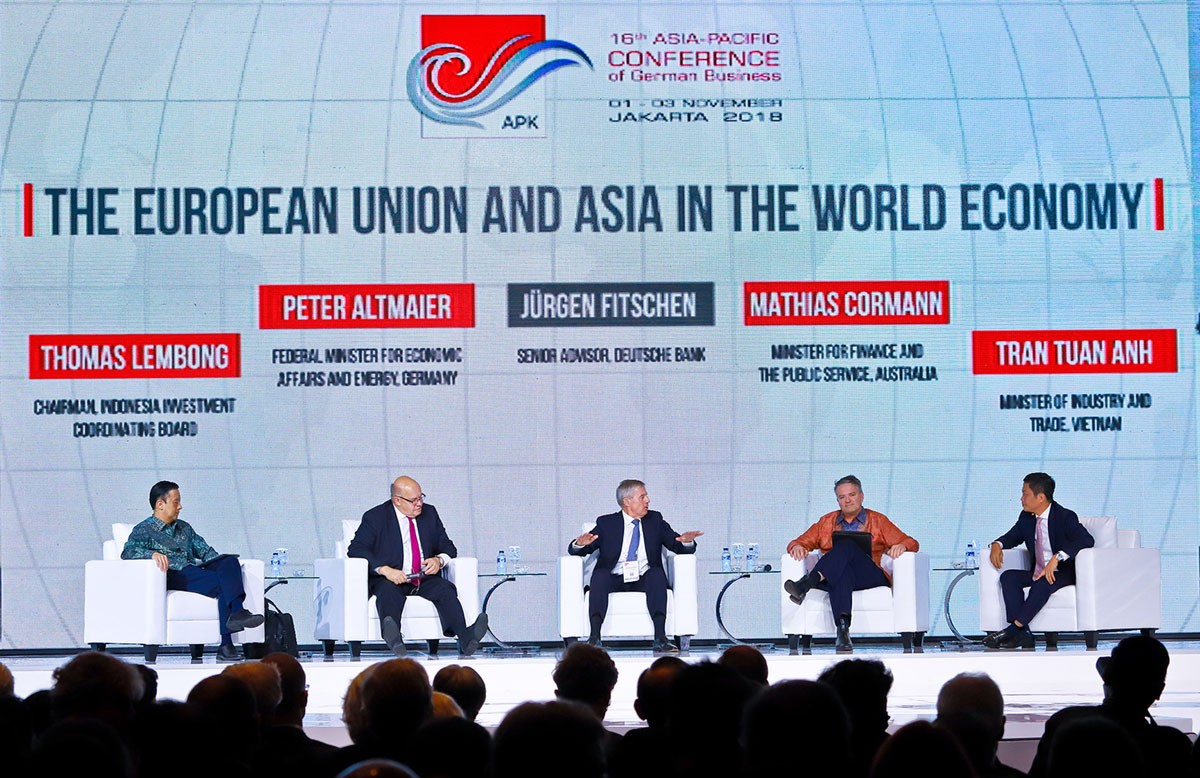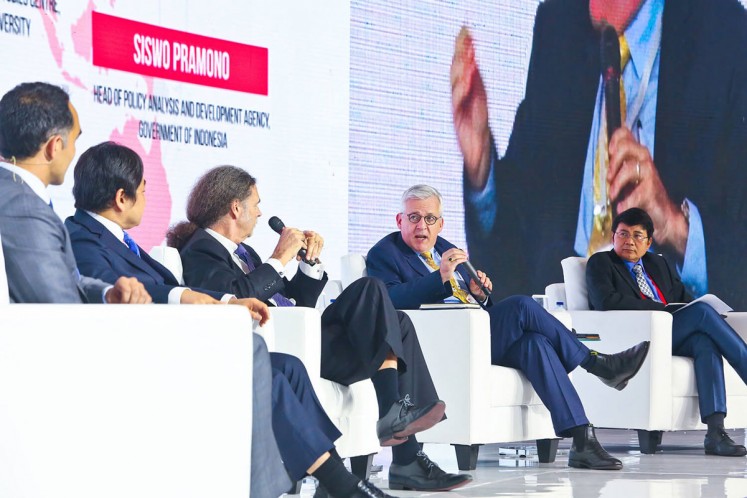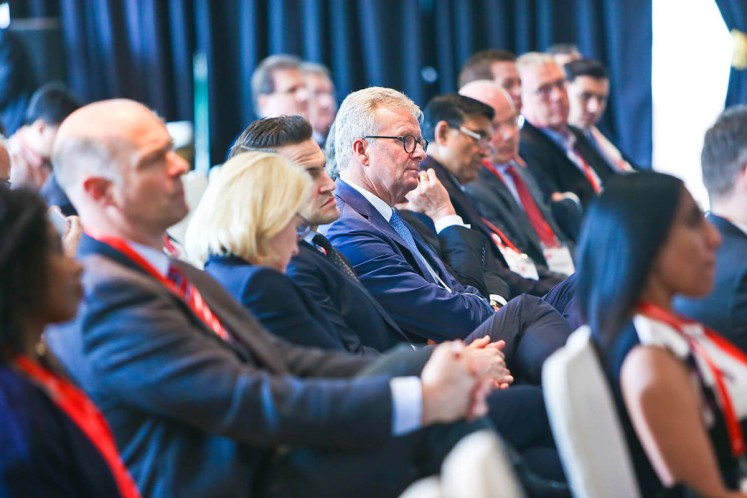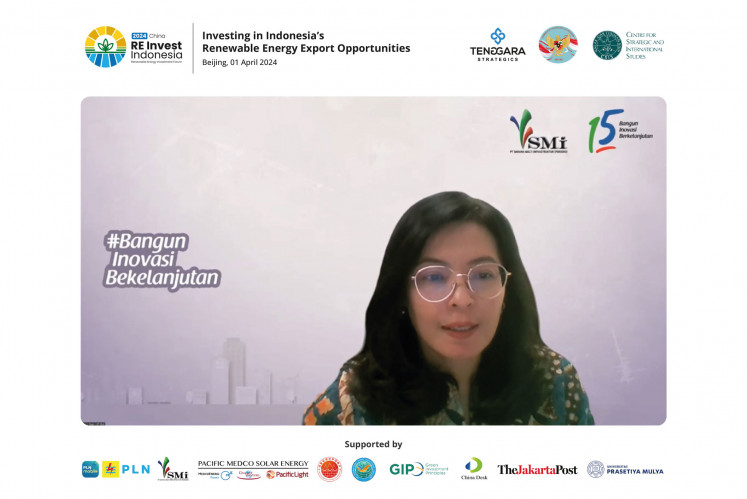16th APK Conference examines global challenges
Change Size

A
t the 16th Asia-Pacific Conference of German Business (APK), which was held in Jakarta from Nov. 1 to 3, German businesses and their partners in the Asia-Pacific region discussed current global challenges in an open way to find the solutions.
At the invitation of the Asia-Pacific Committee of German Business (APA), the German Federal Ministry for Economic Affairs and Energy (BMWi) and the German Chambers of Industry and Commerce in Asia-Pacific (AHK), over 950 registered participants attended the conference. The participants included an interesting mix of high-level business leaders, government representatives and experts.

During the three-day conference, the participants touched on a broad range of issues, such as looming trade wars, Asian and European infrastructure initiatives and how to approach them —either as business opportunities or as hegemonic political projects — and the unpredictable trajectory of digitalization.
“When it comes to the topics of the future that connect Asia and Europe, I cannot think of a better place to discuss trends and to promote international cooperation and rule-based trade than at the Asia-Pacific Conference 2018,” Association of German Chambers of Commerce and Industry (DIHK) president Eric Schweitzer commented.
Local organizer the German-Indonesian Chamber of Industry and Commerce (EKONID), meanwhile, prepared the ground for more than two days of panel discussions, high-level meetings, networking opportunities and colorful Indonesian entertainment.
“I extend my heartfelt thanks to the organizing committee for this remarkable achievement,” said Asia-Pacific Committee of German Business chairman Hubert Lienhard. “I am also grateful to Bertelsmann Stiftung for organizing again the Asia-Europe Young Leaders Forum and allowing up-and-coming decision makers to meet and discuss among each other and with leading politicians and CEOs.”
“For me personally, the most important lesson learned from the APK in Jakarta is that Germany’s cooperation with like-minded countries needs to be deepened and extended,” Lienhard said. “A global coalition of liberal and free-trading countries needs to be built to join voices and convince those who have turned away from cooperation and openness.”
The conference also covered the subject of Asia’s consumers. The report said that by 2030, two-thirds of the global middle classes would be in Asia, only one-fifth in Europe and the US. There are, undoubtedly, huge differences between the various Asia-Pacific markets in terms of age structure, income levels and disparities as well as data protection rules. Asian consumers still have something in common: a strong preference for human-to-human interaction. The digital and mobile applications that can meet this disposition will thrive as the best mediators between service providers and people.
“We are meeting here for the Asia-Pacific Conference of German Business at the most interesting moment in human history: We have never before witnessed such tremendous growth of wealth and of the middle class in Asia,” Indonesia’s Investment Coordinating Board (BKPM) chairman Thomas Lembong commented.

At this year’s APK, the Oxford-style debate on free trade gave an outstanding setting to bring the related controversies to the participants. Despite the victory of the free trade team during the debate, the arguments raised by the critics of the current trade system emphasized the enduring connection of the social and human-centered dimension in the global economy.
Another controversy discussed at the conference was the business potential of China’s Belt-and-Road Initiative (BRI). For now, the initiative seems to have too many elements of a one-way street. However, the panelists disagreed on whether engagement was sufficient to ensure that BRI benefits more than one country. The debate on the opportunities and limits of engagement with China will clearly continue until the next APK to be held in Tokyo in 2020.
“The closing speech in Jakarta was my last appearance at the APK as chairman of the APA,” Lienhard said. “I am grateful for the opportunity to serve the committee in a rapidly changing international environment.”
Lienhard said the three APKs he had co-chaired in Ho Chi Minh City, Hong Kong and Jakarta did not only reflect the discourse about the international developments at the time, but the conferences also ensured that the responses were built on personal contacts and friendships between Germany and the Asia-Pacific. “The APK will continue to be one of our most relevant platforms for these vital personal ties,” Lienhard added.









